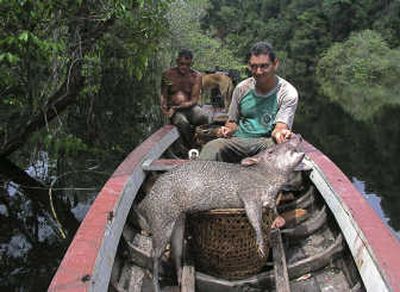Giant wild pig in Amazon is new species, scientist says

RIO DE JANEIRO, Brazil – A Dutch scientist thinks he has discovered a new species of wild pig nearly twice the size of other pigs in Brazil’s Amazon region.
At four feet long and 90 pounds, the pig is the latest in a string of new species that Marc van Roosmalen reported to have found since 1996. His findings were published in the Oct. 29 edition of the German scientific journal Bonner Zoologische Beitrage.
Van Roosmalen said his discovery of the peccary – a kind of wild pig he dubbed Pecari maximus – points out the need to protect the region as a habitat for wild species.
He said he made his discovery by accident in 2000, while searching for a new monkey species.
“I sensed there was something behind me and looked over my shoulder and saw three huge peccaries walking in a row,” he said in an interview. “They came and disappeared like ghosts without making any sounds. That was atypical of peccaries, who always go around making lots of noise.”
The region where Roosmalen discovered the new peccary and other species – mostly primates – lies along a logging frontier around Nova Aripuana, where the number of sawmills has grown from two in 2002 to 14 today.
Van Roosmalen said the wild pig species is remarkable for traveling in small groups, usually two adults, sometimes accompanied by one or two offspring, while other types tend to move in large herds. Small groups are more vulnerable to hunters, he said.
DNA analysis showed the animal diverged from the most closely related species, Pecari tajacu, or collared peccary, about 1 million to 1.2 million years ago, Van Roosmalen said.
Scientists said more research is necessary to confirm the species is new.
“The possible discovery of a new peccary species is very exciting, and plausible, considering recent discoveries of new mammal species in the Amazon,” said Alexine Keuroghlian, a researcher with the Wildlife Conservation Society. But “further research is necessary,” she said.
Van Roosmalen’s success in discovering new species in the Amazon has earned him international acclaim.
In June, it also earned him a 16-year prison sentence in Brazil for auctioning off naming rights to some of the species to raise money for preserving the wild areas where they live. He is appealing the conviction, in which the court ruled naming rights belong to the government.
Many scientists have denounced his conviction, which includes charges of keeping animals without a permit at his home.
Van Roosmalen was jailed for nearly two months before lawyers won his release Aug. 7.
The lawyers contend the charges were trumped up by local logging interests who fear his discoveries may interfere with their efforts to expand into nearly pristine jungle between the Madeira and Tapajos rivers.